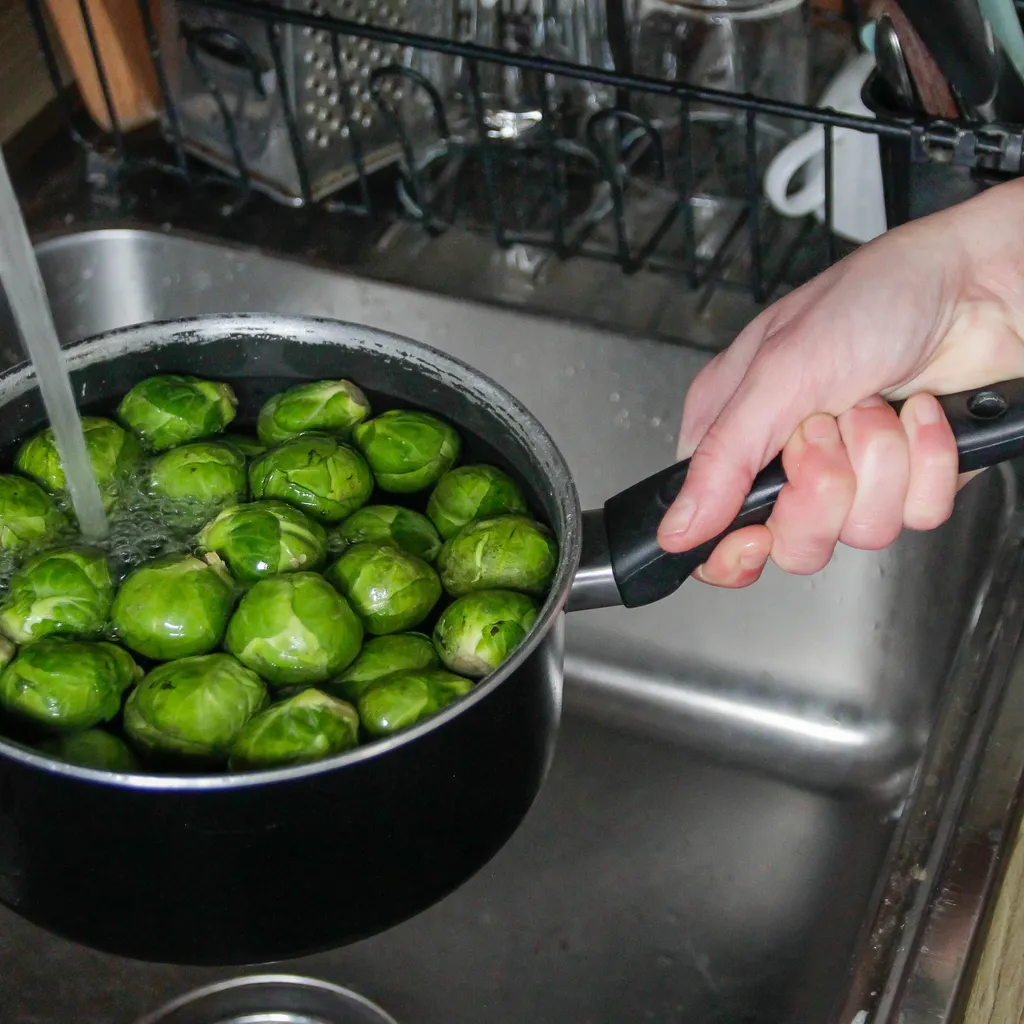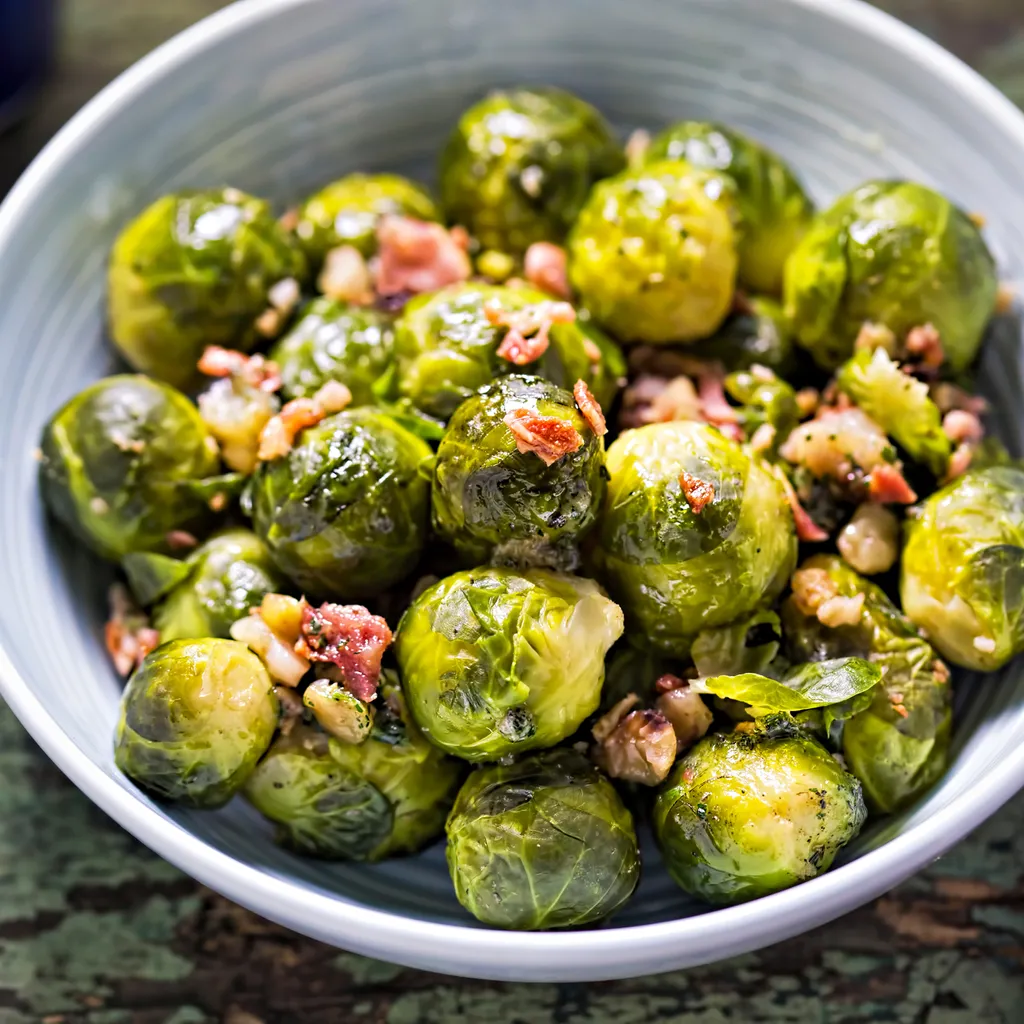Pity the poor old Brussels sprout: 86% water, 9% carbohydrate, 3% protein, 2% sundry other stuff and, according to a good many people, 100% disgusting.
The sprout’s main crime, it appears, is to be one of a small number of British crops that can be harvested in December, a fact that has helped usher it on to festive dinner plates the length and breadth of the country.
Bitter as a Boxing Day family argument, as unloved as discarded wrapping paper (and the celebrity autobiography that was once inside it), some view the Brussels sprout (often misspelt as Brussel sprout) as an aberration, a reminder from the universe that we can’t have nice things unless we have horrid things, too.
But is that really true any more? Whisper it, but perhaps the humble sprout has simply been the victim of terrible PR. So get ready to hold your nose, suppress your gag reflex and read on
- Guide to Britain's best veg boxes
- Christmas recipes: Festive vegetables
- How to make the most of Britain’s winter veg
- Boxing Day recipes: how to use up your Christmas leftovers
Why are they called Brussels sprouts?
Perhaps surprisingly, ‘Brussels sprout’ is indeed derived from the Belgian capital owing to its popularity there during the Middle Ages. However, its origins as a farmed vegetable go back way beyond that.
Why are Brussels sprouts so bitter-tasting and bad-smelling?

The bad smell comes about as a result of a glucosinolate compound in sprouts called sinigrin. This contains sulphur, which is released into the air when the sprout is boiled or steamed. As for the bitter taste, that has more to do with your genes. Or one gene in particular, TAS2R38. That’s the one that enables you to taste a bitter chemical called phenylthiocarbamide (PTC), which is found in sprouts.
Is it a myth that they’re sweeter after a frost?
That’d be a no. A frost or two does actually sweeten a sprout. That’s because the plant releases fructose – a natural sugar found in honey and fruits – as a sort of anti-freeze.
Why do they taste better now than when I was a child?
If you’re no longer in the first flush of youth and have grown to admire, or at least tolerate, the leafy green terrors you used to eschew as a child, there’s probably more to it than merely the maturing of your taste buds.
In the 1990s, a Dutch scientist named Hans van Doorn had a breakthrough. He was able to single out two compounds found in sprouts: sinigrin and progoitrin. These two help defend the sprout against predatory insects who are put off by their bitterness.
By shrewd cross-breeding between high-yielding varieties and sprouts that contained lower levels of the two compounds, it’s been possible to produce crops that are less bitter and thus have a more appealing flavour – to humans and, presumably, insects too.
Who holds the world record for eating the most Brussels sprouts?
Swede Linus Urbanec, who in 2008, ate 31 sprouts in 60 seconds – spiking each one with a cocktail stick and swallowing them one at a time.
How big are Brussel's sprouts?
Your average gravy-paddling sprout weighs around 15g. However, occasionally, unusual weather will result in bizarre harvests. For instance, in 2017, Britain was blessed with meteorological conditions that produced plants of huge proportions, with the sprouts themselves weighing in at around 35g a pop.
But don’t tell that to Bernard Lavery of Llanharry, Rhondda Cynon Taff, because he’d laugh in your face. In 1992, he cultivated what is still the world record for the heaviest sprout: a toe-breaking 8.3kg.
Are Brussels sprouts good for you?

Yes the Brussels sprout is very good for you and is pretty much an entire medicine cabinet in tiny cabbage form. Just take a gander at this list of health-giving properties:
Serve yourself 100g of the little fellows and you’ll be taking on board the same amount of vitamin C as if you’d eaten five oranges. Boom! No scurvy for you over Christmas. They also have huge amounts of vitamin K, which will help your blood to clot when you cut your fingers on the nutcrackers. You’ll also benefit from their smattering of vitamins A and B6, and essential minerals, such as iron, potassium and magnesium.
That same 100g will provide you with 175kJ of energy, which should give you the edge in that post-dinner game of charades. If you’ve got the necessary scientific nous, you could even power your Christmas tree lights with them. That’s what a group of scientists and schoolchildren did in 2015, using 1,000 sprouts and a tree on London’s Southbank.
Sprouts are high in carbohydrates, protein and fibre (keeping you regular, which is handy if you crave some Yuletide ‘me time’ in the bathroom). However, they’re low in calories, which is quite the boon amidst the excesses of the season.
And if you steam your Brussels sprouts (rather than boiling, frying or roasting them), you can lower your cholesterol, too. This works because the soluble fibre in the sprouts is able to bind to low-density lipoprotein cholesterol in your stomach and prevent its absorption into your body.
The clever sprout also contains the pigment zeaxanthin which helps keep your eyes healthy. And if that weren’t enough, Brussels may even protect you against certain cancers.
Yes, along with other members of the cabbage family, Brussels contain sulforaphane, a phytochemical that appears to be able to help prevent DNA in cells from mutating in a way that causes cancer, as well as slowing the growth of tumours. The research is still in its early days, but it looks promising.
So we should all be gobbling them down, right?
Well, maybe not all of us. Vitamin K’s blood-clotting properties are not great if you’re taking blood-thinning medication such as warfarin.
Why do Brussels sprouts make you fart?
Once they’ve reached the stomach, Brussels can produce somewhat, erm, unwelcome consequences – or, to put it in Christmas cracker speak, un-fart-unate (back)side-effects.
The culprit here is a complex sugar called raffinose which is found in several other vegetables (including, famously, haricot beans). Because most of us lack the enzymes needed to break raffinose down, this job is picked up by bacteria, which in turn produce gasses. Unfortunately, one of those gasses is sulphide, the smell of which most humans find somewhat repulsive.
Happily, there are various means of stemming the gaseous tide. You can improve your gut flora before eating sprouts; eat them daily to train your body to deal better with the raffinose; boil them for at least five minutes; chop them up very small or shred them; or eat them with mint (fresh mint is best, but slathering them in mint sauce could also help).
And if all else fails, simply point at the dog and cry: “No! Fido! Not again!
What are Brussels sprouts closest relatives?
If all the brassica family came to stay at Christmas, you’d need a very large table around which to seat them. Aside from our friend the Brussels sprout, family members include cabbage, cauliflower, romanesco, broccoli, mustard, kale and kohlrabi. Perhaps surprisingly, turnips, radishes and horseradish are brassicas too. Then there are the oriental brassicas, such as pak choi, Chinese cabbage and mizuna among many others.
The domestication of brassicas (or, if you want to be really fancy, Cruciferae) for consumption was an important factor in the social development of Homo sapiens and members of the family can now be found growing all around the planet.
We used to believe this process began in Ancient Rome or Greece, but nearly 3,000-year-old texts discovered in India and China mention the cultivation of wild mustard (Brassica rapa). Genetic analysis suggests that humans started experimenting with it even earlier –perhaps up to 6,000 years ago, somewhere in Central Asia.
Attempting to trace the genetic history of the Brussels sprout has driven many a botanist out of their wits, but we do know it is a close relative of wild mustard, the wild cabbage (Brassica oleracea), from which many of our popular food plants are descended, including broccoli, cauliflower, cabbage, and kale.
So when you’re next on a chalky clifftop, look out for the bright yellow flowers of wild mustard and wild cabbage. Without them, our diet would be a lot less interesting.
Who produces the most Brussels sprouts?
Churning out over 80,000 tonnes a year, the Dutch are the world’s largest producers.Perhaps surprisingly, Mexico is not too far behind, and even plucky little Guatemala grows a fair few. The climate in these last two is ideal for harvesting nearly all year round, so you know where to go if you fancy
a fresh sprout in June.
Britons eat more sprouts than any other European nation, leading to Lincolnshire farmer Martin Tate reporting the sale of 1,000 tonnes in a week at Christmastime, which would make for quite the dinner.
